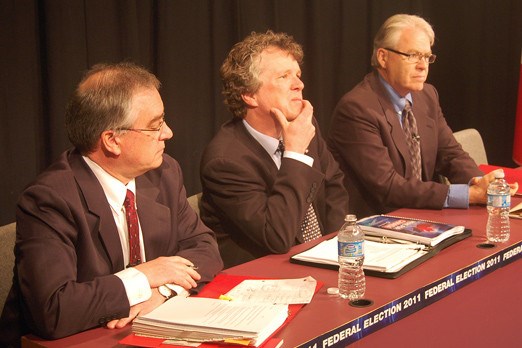The Northwestern Ontario economy and good governance were the key topics for Thunder Bay-Superior North candidates during a recent televised debate.
From questions on FedNor to VIA Rail, the dialogue would always shift back to the economy and how to get it going when NDP candidate Bruce Hyer, Conservative Richard Harvey, the Liberal’s Yves Fricot and the Green Party’s Scot Kyle met in the Thunder Bay Television studio for the one-hour candidate’s debate.
During opening comments Fricot and Harvey took aim at incumbent and NDP candidate Hyer, saying they could represent the riding more effectively. Fricot said the region needs a person in an honest government that will listen to Northwestern Ontario’s ideas on how to bring jobs to the economy.
"We need an advocate in Ottawa," the Liberal candidate said.
Harvey said as the mayor of Nipigon, he’s been an advocate for Northwestern Ontario and that the riding has not had effective representation in the past.
"I’ve been increasingly frustrated," the Tory candidate said. "Fighting and criticizing is not enough for an MP. You have to work with the government."
But Hyer defended himself, telling the audience that he is proud to represent Thunder Bay-Superior North and wants to continue trying make life more affordable for people and bringing jobs to the riding.
"I work for you," He said addressing the camera. "I work for nobody else."
Kyle took used his one-minute opening speech to address the youth and Aboriginal communities in the riding, saying that his party wants to readdress the tax system in Canada.
A question on FedNor led to one of the most heated exchanges as candidates spoke over one another to share their ideas for what to do with the $50 million Industry Canada program. Hyer said the NDP would double the amount and make it a stand-alone industry.
"It would be locally controlled, regionally controlled," Hyer said. "We could make our own decisions."
Fricot agreed, saying the fact that FedNor is not a stand-alone agency, even though there are other federal economic agencies for other regions in the country, shows that Harper treats Northwestern Ontario differently than the rest of Canada.
But Harvey defended his party’s record on FedNor, saying the Conservatives indeed recognize the unique challenges Northwestern Ontario faces. A stand-alone industry would only create more red tape and increase bureaucracy.
"I’m absolutely fine with keeping it the way it is because it allows for flexibility so we can get the money out the door faster," he said. "The bureaucrats tell me they’d love it to be an agency because it makes their job easier."
But it was Fricot who questioned that logic, asking if that is the case then why would the government have federal economic agencies at all?
"Based on that rationale, get rid of all the other ones," he said. "It’s simply become the plaything of Muskoka."
Hyer said over the last three years Thunder Bay-Superior North has received almost $23 million in funding before Harvey accused the NDP of voting down most Conservative programs.
When discussion turned to the current 16.2 per cent corporate tax rate, Harvey said the opposition parties are not talking about a Conservative tax cut of $6 billion, but rather an NDP and Liberal tax hike. A lower corporate tax rate stimulates the economy, he said.
Going around the region, Harvey said small business owners have told him they need low corporate tax rates.
"If they put it back to 18 per cent, I can’t make ends meet," Harvey said, quoting what he said he has heard from business owners in Geraldton and Nipigon.
But Hyer said the tax rate for small business has been 11 per cent for more than a decade. The 16.5 per cent rate is for corporations with profit above half-a-million dollars and doesn’t help anyone in Northwestern Ontario.
Fricot agreed with his NDP rival, saying that only a very small portion of Canada benefits from the low corporate tax rate.
"On that basis (low corporate tax rate) our economy in Northwestern Ontario should be booming and it’s not," Fricot said.
When asked whether reinstating VIA rail service back to Thunder Bay was feasible, Hyer said he has more than 7,000 names on a petition from people in the riding who think so. When the service was discontinued, it wasn’t an economic decision but rather about keeping a lifeline open for communities up North that had no other transportation choice.
Now that most of those communities are "ghost towns", Hyer said bringing back passenger service to Thunder Bay would be a good way to stimulate the economy through tourism.
But Fricot and Harvey, both agreeing that passenger service would be nice, said bringing the service back wasn’t a priority for the region. Harvey said the idea is very nostalgic, but didn’t believe it was realistic.
"I would love to share that experience with my children" Harvey said. "It’s a wonderful thing but the reality is we have to always stop and say "how would we pay for these things?"
Kyle said Canada is the only G7 nation without a national transportation strategy.
The country needs to stop its dependency on oil and start that strategy, he said.
The money for VIA service in Northwestern Ontario could come from opting out of military operations with the United States, the Green candidate added.
"That’s where I would get the money," Kyle said. "I’d bring it back home."
